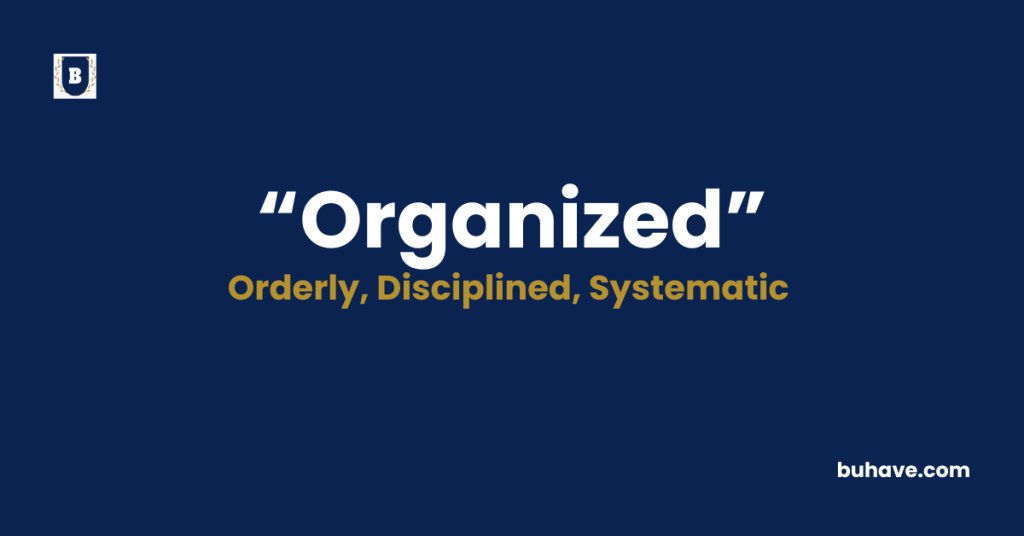The word ‘Organized’ (Adjective) describes a person, environment, or task that follows a clear structure or plan. in this guide, you’ll learn the full definition, synonyms, antonyms, etymology, and real-life examples of how to use ‘Organized’ correctly in sentences.
Organized Explained in Depth
A complete and detailed guide to the words Organized including meaning, definition, examples, etymology, synonyms, and antonyms.
Meanings of Organized
Organized in means that someone or something stays neat, plans ahead, and keeps things in order. When you’re organized, you don’t just react to life as it comes; instead, you take steps to arrange your tasks, time, or space in a way that makes everything run more smoothly.
Moreover, people often say someone is organized when that person remembers important things, sets clear priorities, and avoids chaos. Rather than letting mess or confusion take over, an organized person creates structure and clarity—whether at home, at work, or in their thoughts.
Definition:
it refers to the state of being arranged in a systematic, orderly, and efficient manner. It describes a person, environment, or task that follows a clear structure or plan.
The word a state where things are arranged in a structured, efficient, and orderly manner. When someone or something is described as in it usually means that there is a clear system in place—whether it’s a neat workspace, a well-planned schedule, or a person who manages tasks with purpose and clarity. In everyday life, an it person often knows where things are, prioritizes responsibilities, and follows through with plans smoothly.
Etymology:
The word “organized” traces its roots back to the idea of structure and order. Originally, it comes from the Latin word “organum,” meaning “tool” or “instrument.” In time, Latin speakers developed “organizare,” meaning “to arrange” or “to set in order,” especially referring to how parts work together in a system. Later, during the Middle Ages, Old French adapted it into “organiser,” carrying the same idea of putting things into a structured form. Eventually, English borrowed “organize” in the early 15th century, using it to describe not only physical arrangements but also the coordination of ideas, people, and activities.
As language evolved, the word “organized” came to describe anything that showed clear planning, thoughtful structure, and effective management. First of all, she kept her notes perfectly Systematic for the big exam.
Example Sentences:
- First, she organized her workspace carefully to improve her focus throughout the day.
- Because he stayed organized, he finished his projects well before the deadline.
- They organized the files by date, which made it easier to find important documents quickly.
- After organizing her schedule, she managed to balance work and personal life much better.
Organized Synonyms:
- Systematic
- Orderly
- Structured
- Methodical
- Coordinated
- Neat
- Efficient
- Disciplined
- Tidy
- Well-planned
Organized Antonyms:
- Disorganized
- Chaotic
- Messy
- Unsystematic
- Disorderly
- Haphazard
- Confused
- Scattered
- Cluttered
- Unplanned
FAQs about Organized
Here are some FAQs about “Organized”
1: What does it mean to be organized?
Being organized means keeping things neat and arranged so you can find them easily, and planning your tasks so you finish them on time.
2: Why is being organized important?
Being organized helps you save time, avoid stress, and stay focused on your goals.
3: How can I become more organized?
You can become more organized by making to-do lists, setting priorities, keeping your space clean, and planning your day in advance.
4: Does being organized mean being perfect?
No, being organized doesn’t mean you have to be perfect. It means trying your best to keep things in order and manage your time well.
5: Is being organized helpful for mental health?
Absolutely! Being organized can reduce anxiety and help you feel more in control of your life.
6: Can anyone learn to be organized?
Yes, anyone can learn to be organized by practicing good habits and staying consistent.
7: What are some tools to help stay organized?
You can use planners, calendars, apps, or simple notebooks to keep track of your tasks and schedule.
Read more O words:

















